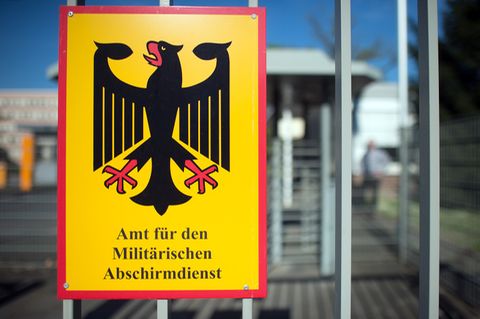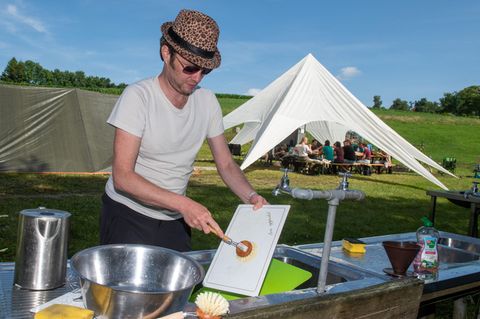Mr Gademann, you run the Institute on the Rosenberg in St. Gallen. Your institute has been around for quite a while. What has remained over that time?
We have been around since 1889. Of course, a lot has changed, but what has remained the same is the internationality. Children, young people from all over the world, come together here to live in a community. My great-grandfather was a pioneer of individual education. We think there is no one-size-fits-all concept. Each person is unique and each person has different strengths, different weaknesses. The absolute majority of our parents are entrepreneurs and they want an entrepreneurial mindset, entrepreneurship, creativity.
Most parents are self-employed entrepreneurs and very successful at it. The Rosenberg is a very elite boarding school. What does "elite" mean to you?
For us, elite means that someone who has the knowledge, the ability and the experience to take on responsibility is also prepared to carry this responsibility for others. In this context, we have no problem with the word. We have a problem with the word "elite" because it divides society and it says, "Elite, that's them up there and they're completely disconnected from reality." That is not our approach. We are often asked the question whether the children who come to us are spoiled. No, they're not, because they're in an environment where they can't set themselves apart by showing off their wealth or their parents.
After all, the price of education alone sorts out many students. A year at the Rosenberg costs about 140,000 francs.
Our students are certainly privileged. But every pupil at a German state school is also privileged compared to a child who goes to a village school in a developing country, for example. Privilege is not a problem as long you are aware of the privilege. Privilege becomes a problem when you are not aware of it and I think that is the case with traditional public schools. There you are unhappy and unaware that you are actually extremely privileged compared to large parts of the world's population.
Unlike in 1889, the year you were founded, today there are international schools in every major city. And yet you claim to be something special.
There are very many international boarding schools, but very few are truly international. We consciously make sure that individual nationalities could not dominate. We make sure that we have a good mix when selecting students. Later on, the students go back to their home countries, maybe after graduation, but they have learned that there are different approaches to solving a problem, that there are different cultures, that you yourself belong to one culture, and that you have to invest in other cultures.
All these children come to you in Switzerland. Boarding schools always have the reputation that the children are disruptive at home and will be deported.
There are these prejudices, but mainly in continental Europe. In other countries, boarding school is the norm. And as you noted, it's not a cheap education. Someone who wants to deport their children doesn't have to spend 140,000 francs a year to do so. Our parents send their children to us, because they want to have the kind of education we offer and because they can't get this education for their children anywhere else. We would also notice something like that in the selection process. We don't take in children who are unhappy with that decision.
After all, boarding school is always a loss of the family ...
And a step into a life of their own. Children not only perceive this change as separation, they also see the opportunities. They find a community and new friends. Children also appreciate this independence. When you give a young person the chance to take responsibility for themselves, they enjoy it immensely. Our students are happy that we respect them and that we take them seriously. Their ideas, their thoughts, their concepts.
What distinguishes the Rosenberg from the state schools?
The state schools have moved away from their original ideals. At present, it is all about conveying a prefabricated concept to as large a group as possible. They work towards exams, but that also means that the content of the exams is the actual curriculum. We don't want to teach anything from a dusty course book. Nowadays the world is developing so fast, we want our education to be relevant, that's why we also write our own learning content. If you come to us with an idea for a great course, we can get that course into the classroom within a couple of days. In the traditional education system, you present your idea to a committee, then they tweak it, then there are policy considerations, then a course book is written, then that is communicated. Then you have to invite the teaching staff to train them for that course. In other words, by the time the great idea reaches the student in the classroom, 10 years have passed.
It's easy to say our course is great, the state school is dusty. What does that look like in concrete terms?
Our key point: we are moving away from simulation. In traditional schools, 99.9 per cent of teaching is an abstract simulation of reality.
By that, you mean assignments that allude to reality but remain in the world of the course book and classroom? So learning as a 12-year exercise in dry swimming?
Exactly, nothing ever happens in real life. If you write an essay, it gets corrected and then it gets filed. We want school to be in a real-life context. We do that with partnerships. We work with Boston Dynamics with ETH Zurich. We work with different start-ups, we have a new project with a school in Soweto, South Africa. Our students work on projects that are relevant. Then the lessons automatically become exciting and teach skills that are needed today. Example: We are working with YASAI, a spin-off of the Zurich University of Technology (ETH), on concepts for vertical gardens. This is about the sustainable production of food. Our students in grades 6-8 met with the designers, learned about the concept of these gardens, and then developed their own model for a vertical garden. The design was made with 3D printers and then installed. Artificial intelligence measures whether the water has the right nutrient content. So many aspects from mathematics to art, design to biology, the natural sciences flow together in one project. This allows our students to work on problems on a small scale that the whole world is dealing with on a large scale. It also shows them that the world is not divided into school subjects. Students learn on their own how to work together in teams if they want to make a difference. They learn that it is okay to ask questions. But also that you can make mistakes and then have to take another step back.
And that doesn't happen enough in traditional schools?
We also see ourselves as an incubator for ideas and concepts, and we believe that most of them can be implemented at any school. Whether it's in Frankfurt am Main or in Peru, it doesn't matter. It's a question of attitude. You must be willing to take risks and we know that the classical teacher and classical schools don't like to take risks. Civil servants are rarely "risk takers" and the project I just described has a lot of risks. In the beginning, nobody, not even the teacher, knows what exactly the product will be and how to get there. That is why it is an exciting process.
Such processes accompany your teachers. They also call them artisans - that is, artists of education. Who becomes a teacher at Rosenberg?
We handpick our teachers. It's a very intensive process to choose the right specialists, it's not just about subject knowledge, it's mostly about attitudes. The teacher in the classroom is basically also an entrepreneur. He must be able to act in every situation with the students. They cannot stick to a plan or a book. An example: you are discussing DNA, i.e. genetics, then a student says, the beat and rhythm of the individual sequences sounds familiar to me, from music class. At that moment, when a student is interested, produces an important transfer, you must be able to press pause and respond to it. A teacher is a life artist, he must have the intuition, the expertise, the self-confidence to be able to respond to something like that at that moment and support this linking of concepts. You can't abdicate responsibility at the Rosenberg. If something doesn't work, you can't blame the curriculum or unmotivated students. All these excuses, that's something we don't accept here. Being a good teacher is a vocation and our teachers are excellent in every way. Our teachers enjoy what they do because it is what they always wanted when they chose the profession. Those who work for us don't want to work in an encrusted system, they want to make a difference.
So your teaching is more holistic, practical and looks for solutions to real problems. Where do you see the difference between government schools and your institution within the institution?
When monopolies rule, there is no innovation and I think that is the problem with state schools. The content is increasingly diverging from reality because it is no longer up to date. This is a big crisis, but there is no fundamental discussion. No one is asking, "Why are we there in the first place?" I fear that traditional schools are now there for their own sake. The goal of education should be to help healthy, happy, knowledgeable, creative people develop so that they can be successful and satisfied later. And in my opinion, this goal has been completely lost sight of. How much today revolves around benchmarks, around exams where the outcome of the tasks is fixed from the start? Writing exams is a skill that is used much less in life today than it ever was in the past. Schools would have to accept that what is taught today is irrelevant, that it doesn't work. The teachers are dissatisfied, the parents are dissatisfied, the students anyway. Nobody is satisfied and yet it goes on and on every day. That is crazy.
Are you saying that an institute like yours could not exist if parents and students are dissatisfied and teachers are frustrated?
We at Rosenberg have to think continuously about where the opportunities are, how we move forward, what the parents want, what the students want, at which part of the shore they want to get into our boat and where they want to get out. Only a monopoly-like authority structure can afford to ignore such desires and say we get so-and-so many students a year and they will somehow run through.
The cult of exams and comparable test results is very important today. There are benchmarks that put every school in a worldwide competition. This makes "education" measurable and comparable. But you say that doesn't do anything for the students?
We get clear feedback from universities and from employers who say that what is taught in education in traditional schools is not enough and that it takes years to "unlearn" it. What you teach students, these behavioral patterns that are conditioned in schools, are counterproductive. You first must start valuing people again. Asking, what is your opinion? Or show them how important it is to take a risk. But exams that require ticking off the keywords of an expectation chart are complete nonsense. You have to consider how much human strength and self-confidence is lost along the way. No wonder there are so many unhappy people. One of our approaches is to give students the chance to create something with their own abilities. To be happy, to realize, I am a human being, I create something. This happens when the students realize that a project can be implemented in real life.
But you don't do without tests and grades either. Your students also want to study, and they need the points in these tests.
Despite our approach and philosophy, we know that our students need top marks in external exams. We know we need to achieve both because without the top grades, all the things we care about don't help much. Maybe in a few decades it will be different, but this standardized testing will be with us for a while. Still, it's a wrong way to go. These are all tasks that computers can already solve today. That any computer can answer ten times better. That cannot be the approach of education. There is a great risk that we will continue to provide education in traditional schools that is completely obsolete today. And it will get worse in the future because machines will take over more and more tasks.
At schools, problem-solving thinking is propagated instead of memorization, isn't it? That probably won't convince you, because even that is tested with a standard test with ready-made answers.
If you paint black stripes on a white horse, it is still not a zebra. It's a template, here are eight points that supposedly lead to the solution of the problem. No one asks if it really prepares students better for life and to solve real problems. Artificial intelligence instructional programmes already exist for teaching based on scores on standardized tests. They do a better job than the average teacher. The artificial intelligence focuses on each student and notices very quickly who needs more support in which subarea. A teacher can't do that with 25 students. I dare say that the more a school prepares for standardized tests, the sooner this technology will replace the classical teacher. There are already examples of this in the South American jungle, where no teachers are available for remote villages. There, pupils learn exclusively with computer programmes and they achieve better test results than their peers in cities who attend classes. That is why we say our teachers must bring something to education that a computer programme cannot.
If AI programmes lead to better results in standardized tests, shouldn't that also lead to a reversal in the state school system?
I fear the opposite will happen. Human labor is expensive. The temptation is to use fewer teachers and more programmes. In Germany, the costs of school attendance are financed through tax revenues, but internationally it's a different story. Parents will say, actually, the children don't need to come to class any more. We are now doing this with AI at home, because even the top universities accept these standards. If parents are more satisfied with the AI service than with a teacher, and the results prove them right, it is hard to argue. Fundamental changes will come to schools and those that are not adaptable enough, and that is probably most traditional schools, will have an existence problem. In a highly cost-oriented education system, their current task of "exam preparation" will be shifted to the cloud. This is a shake-up that is rolling towards the state education system, even if they don't want to admit it yet.







